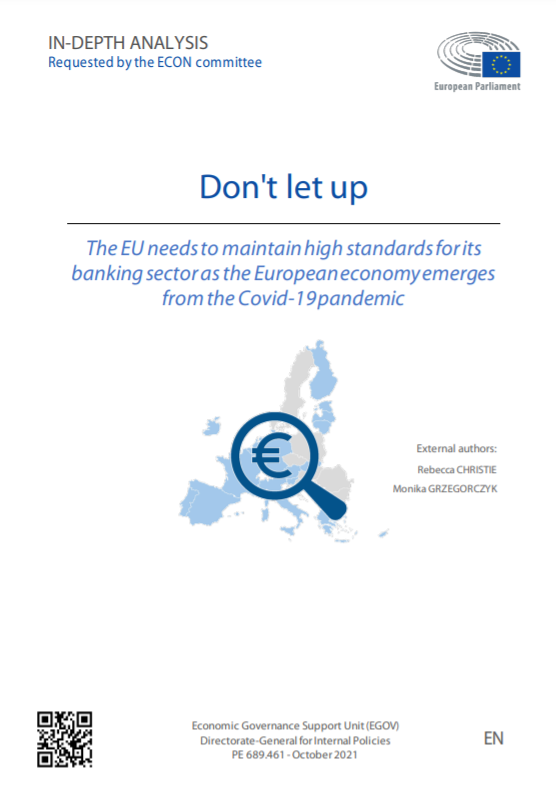Blog Post
A call for uniform sovereign exposure limits
Banks’ sovereign bond holdings were at the heart of the euro-sovereign crisis. The concentration of domestic bonds created a vicious cycle between governments and banks. There are several proposals to end this link, including concentration limits on southern European bonds. We argue for a uniform limit to reduce flight-to-quality effects on northern European bonds. Such a uniform limit would also be more acceptable politically.
In recent years we have seen sovereign financial problems spilling into the banking sector because the banking sectors have held a very large share of the domestic sovereign debt. This is clearly not desirable. First, by buying these domestic sovereign bonds, the banking sector allows governments to overspend. Second, the excess bad sovereign debt crowds out private credit to the real economy (Acharya et al, 2016). This creates a negative feedback effect on the economy. Third, banks that are overloaded with domestic government bonds eventually might have to bailed out, which continues the the vicious cycle between governments and banks. This loop was at heart of the euro-sovereign crisis.
There are several reasons for this phenomenon, including the lack of regulatory capital charges for risky sovereign debt (Popov, 2016), moral suasion by politicians and local central bankers (Ongena, Popov, and Van Horen, 2016; De Marco and Machiavelli, 2016), and crucially the absence of mandatory concentration limits. A concentration limit would set a cap on holdings of bonds issue by any single government and thus force banks to diversify their portfolio of liquid assets. Another way to reduce government bond holdings is to impose capital charges, but that would not solve the concentration problem.
We see a system with mandatory sovereign concentration limits as an important solution. Such a system is likely to lead to an earlier market discipline effect. However, this proposal is politically difficult to accept for the southern European countries, which would feel the constraining effect most (at least in the short to medium term). This sentiment is strengthened by the northern European view that such concentration limits should only or to a stronger degree apply to sovereigns with low creditworthiness. We disagree with this northern European view and argue that there are additional, Eurozone-wide benefits of imposing universal sovereign concentration limits.
What is key in our view is that sovereign concentration limits apply to all sovereigns alike, creditworthy or not. This approach has five important benefits.
First, if implemented this way, flight to quality effects on the safe end of the sovereign credit risk spectrum will be mitigated. Because of the universal sovereign concentration limits, demand for high quality paper will be curtailed in a crisis and hence the flight to quality becomes less steep. As a result, monetary policy will more equally affect the Eurozone, potentially lowering northern European resistance to non-standard expansionary monetary policy (anomalies like negative rates on long-term bonds are then more easily avoided).
Second and related, since exposure limits are independent of creditworthiness, this measure entails a very low degree of pro-cyclicality.
Third, higher yields and a larger availability of the safest bonds provide a stronger economic incentive for southern European banks to substitute part of their own country’s sovereign bonds by safe, say German bonds. This strengthens the balance sheets of these banks and ensures that these banks have a diversified collateral pool that they can use to generate liquidity in a crisis, even when their own sovereign is downgraded massively.
Fourth, in case of a sovereign restructuring, it is easier to reach agreement among bondholders as their portfolio positions will be more similar.
Finally, the fact that northern sovereigns will benefit less from others’ distress may make such a proposal politically more feasible.
In the EU, the main regulatory tool to ensure that banks limit their exposure to a single client is the large exposure regime, which limits any such exposure to 25% of own funds (ESRB, 2015). The exemption of sovereign bonds can be removed in full or partial, for example a limit of 50% or 75% of own funds. Moreover, a transition regime is needed to prevent shocks to the government bond market. Banks can, for example, be granted a two-year transition period to reduce their current holdings (which will partly expire in any case). To make the change happen, banks will in the meantime not be allowed to buy bonds from those governments, where these banks exceed the new large exposure limit for those government bonds (at 25, 50 or 75% of own funds).
In conclusion, we propose mandatory concentration limits on sovereign bond holdings of all sovereigns, in order to stabilise the financial sector and mitigate flight-to-quality effects.
References
Acharya, Viral V., Tim Eisert, Christian Eufinger, and Christian W. Hirsch. “Real effects of the sovereign debt crisis in Europe: Evidence from syndicated loans.” (2016).
De Marco, Filippo, and Marco Macchiavelli. “The political origin of home bias: The case of Europe.” (2016).
ESRB (2015), ‘ESRB Report on regulatory treatment of sovereign exposures’, European Systemic Risk Board, Frankfurt.
Ongena, Steven, Alexander A. Popov, and Neeltje Van Horen. “The Invisible Hand of the Government: ‘Moral Suasion’ During the European Sovereign Debt Crisis.” (2016).
Popov, Alexander. “Banks’ Love Story with Sovereign Debt: Causes, Consequences, and Policy.” The Future of Large, Internationally Active Banks 55 (2016): 167.
Republishing and referencing
Bruegel considers itself a public good and takes no institutional standpoint. Anyone is free to republish and/or quote this post without prior consent. Please provide a full reference, clearly stating Bruegel and the relevant author as the source, and include a prominent hyperlink to the original post.





















